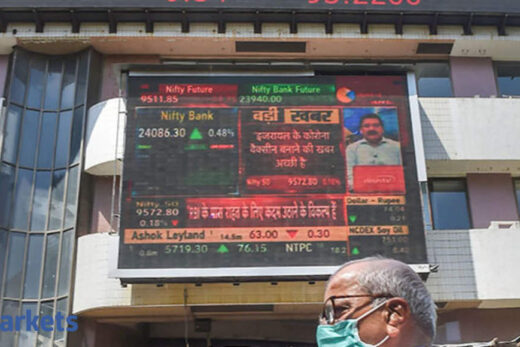The trading range remained narrow. The index oscillated in a 279-point range, exhibiting a bearish bias throughout the past several days. The index finally closed with a net loss of 138 points (-0.87 per cent) on a weekly note.
The market has not only shown classical distribution at higher levels, but appears to be showing ample signs of a likely corrective move, which now looks imminent.
Nifty was unable to take out the 15,850-15,900 zone despite few attempts and that has made this zone an intermediate top for the market. Options data showed high Call Open Interest addition in the 15,800-15,900 range is making it a formidable resistance area for the index. Nifty has faced resistance at a major trend line support. A slip below the 15,550-15,600 zone will make Nifty weaker.
Volatility continued to drift lower. India VIX has slipped a further 9.56% on a weekly basis and now stays at 12.09. This level is near the lowest level seen in the recent past.
 ET CONTRIBUTORS
ET CONTRIBUTORSThe 16,000 level, just like the week before this one, remains a psychological resistance for Nifty. However, the 50-pack will face resistance at 15,850 and 15,915 levels. Support should come in at 15,550 and 15,430 levels. Any corrective move is likely to make the trading range wider than usual.
The weekly RSI stood at 65.80 level. It remains neutral and does not show any divergence against the price. The daily MACD remains bullish and stays above the Signal Line. However, the near-flat histogram shows that the momentum is lacking in Nifty moves. A black candle has appeared. The same level of the opening and the high point of the week shows that the consensus among the market participants remains negative from the very start of the previous week.
 ET CONTRIBUTORS
ET CONTRIBUTORSPattern analysis on the weekly chart shows Nifty has rested itself on a major rising trend line support. That trend line begins from the lows formed in March 2020 and joins the subsequent higher bottoms. Since Nifty has tested this important pattern support, any move below this area will make things worse for the market.
Although the market is showing no intent of correcting or consolidating, it is not moving higher in a healthy way as well. The persistent low volatility can inevitably lead to a phase of high volatility. There are all the possibilities that as long as Nifty remains below the psychologically important 16,000 mark, it will remain vulnerable to bouts of volatile profit taking at higher levels.
Although no major negative moves have been seen in Nifty as yet, there are a few technical signs that one cannot afford to ignore. The VIX stays near its lowest levels and a prolonged period of low volatility indicates complacency among market participants. Such a situation often leads to periods of high volatility.
 ET CONTRIBUTORS
ET CONTRIBUTORSThe market breadth remains weak, and is not as healthy as it should be. A strong market breadth and wider participation are required for any meaningful bounce to take place. All in all, we strongly recommend refraining from creating aggressive long positions.
New purchases, if any, should be limited to defensive low beta stocks. While staying light on the overall position, we suggest using every rise, as and when it happens, to protect profit at higher levels.
In our look at Relative Rotation Graphs®, we compared various sectoral indices against CNX500 (Nifty500 Index), which represents over 95% of the free float market-cap of all the listed stocks.
A review of the Relative Rotation Graphs (RRG) shows Nifty Commodities and Nifty Metal Indices have slipped inside the weakening quadrant, indicating a likely end to their relative outperformance against the broader market. Nifty Pharma, Energy, Smallcap and the PSE Indices remain inside the leading quadrant. These groups may relatively outperform the broader Nifty500 index.
Nifty Midcap 100 stays inside the weakening quadrant. The PSU Bank Index is also inside the weakening quadrant, but it is rapidly improving on its relative performance.
Nifty Auto index is inside the lagging quadrant. However, it appears to be rotating to enter the improving quadrant along with the Nifty Financial Services Index, which is exhibiting a similar behaviour. Apart from this, Nifty IT Index also lies inside the lagging quadrant. Nifty Bank, Realty and the Infrastructure Indices are also inside the lagging quadrant, but they are trying to consolidate and improve their relative performance.
The FMCG Index has rolled back inside the lagging quadrant. Nifty Consumption and Media Indices stay inside the improving quadrant; while the Consumption index is seen rapidly paring its relative momentum on the lines of the FMCG Index.
Important Note: RRGTM charts show the relative strength and momentum for a group of stocks. In the above chart, they show relative performance against Nifty500 Index (broader market) and should not be used directly as buy or sell signals.
(Milan Vaishnav, CMT, MSTA is a Consultant Technical Analyst and founder of Gemstone Equity Research & Advisory Services, Vadodara. He can be reached at milan.vaishnav@equityresearch.asia)



